| This article needs additional citations for verification. Please help improve this article by adding citations to reliable sources. Unsourced material may be challenged and removed. Find sources: "Jewish quarter" diaspora – news · newspapers · books · scholar · JSTOR (October 2012) (Learn how and when to remove this message) |

In the Jewish diaspora, a Jewish quarter (also known as jewry, juiverie, Judengasse, Jewynstreet, Jewtown, Judería or proto-ghetto) is the area of a city traditionally inhabited by Jews. Jewish quarters, like the Jewish ghettos in Europe, were often the outgrowths of segregated ghettos instituted by the surrounding Christian or Muslim authorities. A Yiddish term for a Jewish quarter or neighborhood is "Di yiddishe gas" (Yiddish: די ייִדישע גאַס ), or "The Jewish quarter." While in Ladino, they are known as maalé yahudí, meaning "The Jewish quarter".
Many European and Near Eastern cities once had a historical Jewish quarter and some still have it. The history of the Jews in Iraq is documented from the time of the Babylonian captivity c 586 BC. Iraqi Jews constitute one of the world's oldest and most historically significant Jewish communities.
Arabic world

From the late medieval and early modern period onwards Jews, the only remaining dhimmi, were increasingly confined to ghettolike quarters, such as the mellah in Morocco, the hara in Algeria and Tunisia and the qa'a in Yemen. The mellah of Fez, founded in the fifteenth century, became the prototype of the Moroccan ghetto. Though it was probably founded in order to protect and not to punish the Jews, they resented the transfer and viewed it as bitter exile and manifestation of a painful segregation.
Later foundation were founded with the explicit intent of ostracism rather than protection. As such, Jews often had to wear distinguishing clothes and were not allowed to wear shoes outside the mellah. In cities, a mellah was surrounded by a wall with a fortified gateway, often close to kasbah of the king or governor, whereas rural mellahs were separate villages inhabited solely by the Jews.
Europe

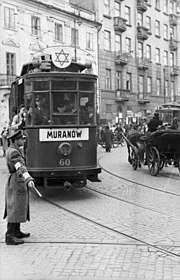
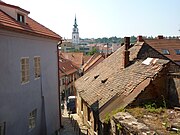
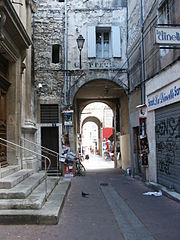



Jewish quarters in Europe existed for a number of reasons. In some cases, Christian authorities wished to segregate Jews from the Christian population so that Christians would not be "contaminated" by them or so as to put psychological pressure on Jews to convert to Christianity. From the Jewish point of view, concentration of Jews within a limited area offered a level of protection from outside influences or mob violence. In many cases, residents had their own justice system.
When political authorities designated an area where Jews were required by law to live, such areas were commonly referred to as ghettos, and were usually coupled with many other disabilities and indignities. The areas chosen usually consisted of the most undesirable areas of a city.
In the English city of Norwich, the Jewish quarter was close to the castle, as a source of protection in times of local pogroms. This pattern was seen in other English towns, where Jews were under the protection of the Normans.
In the 19th century, Jewish ghettos were progressively abolished, and their walls taken down, though some areas of Jewish concentration continued and continue to exist. In some cities, Jewish quarters refer to areas which historically had concentrations of Jews. For example, many maps of Spanish towns mark a "Jewish Quarter", though Spain hasn't had a significant Jewish population for over 500 years.
Over the course of World War II, Nazi Germany reestablished Jewish ghettos in Nazi-occupied Europe (which they called Jewish quarters) for the purpose of segregation, persecution, terror, and exploitation of Jews, mostly in Eastern Europe. According to USHMM archives, "The Germans established at least 1,000 ghettos in German-occupied and annexed Poland and the Soviet Union alone."
- Austria
- Hohenems: Jewish Quarter [de]
- Salzburg: Judengasse [de]
- Vienna: Judenplatz (1280-1421); Leopoldstadt
- Belarus
- Dziatlava: Zhetel ghetto
- Minsk: Minsk ghetto (appr. 100,000 Jews, local and deported from Austria, Germany and the Czech Republic, during the Second World War)
- Belgium
- Antwerp: Joods Antwerpen (35,000 Jews before 1940, 15,000 nowadays)
- Czech Republic
- France
- Bordeaux: Saint-Seurin
- Draguignan: Juiverie de Draguignan [fr]
- Lyon: La Juiverie de Fourvière (rue Juiverie) and La Guillotière [fr]
- Marseille: La Carrière-des-Juifs and Mont-Juif or Montjusieu
- Paris: the Pletzl in Le Marais district
- Les Josiols is a former Jewish quarter situated north of Mirabel-aux-Baronnies
- Germany
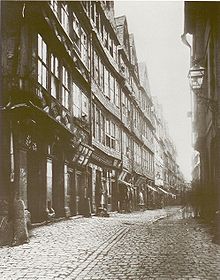
- Berlin: Judengasse [de] and the Bayerisches Viertel [de]
- Cologne: Judengasse [de]
- Frankfurt: Judengasse
- Hamburg: New Town, Grindel [de], and Eimsbüttel (History of the Jews in Hamburg)
- Hanau: Nordstraße [de]
- Koblenz: Koblenz [de]
- Leipzig: Brühl)
- Speyer: Jewish community of Speyer
- Stuttgart: Judengasse [de]
- Trier: Judengasse [de]
- Worms
- Greece
- Hungary
- Ireland
- Cork: "Jewtown" around Albert Road
- Dublin: Portobello
- Italy
- Caltagirone: Iudeca (Giudecca)
- Catania: Judeca Suprana, Judeca Suttana and Piano di Giacobbe
- Enna: Iudeca (Giudecca)
- Messina: Tirone and Paraporto
- Naples: Giudecca
- Padua: Paduan Ghetto
- Palermo: Meschita and Guzzetta
- Reggio Calabria: La Judeca (Giudecca)
- Rome: Roman Ghetto
- Syracuse — La Jureca (Giudecca)
- Venice: Venetian Ghetto
- Ferrara: Ghetto di Ferrara
- Netherlands
- Amsterdam: Jodenbuurt; Jodenbreestraat (until World War II); Buitenveldert (contemporary)
- Poland
- Kraków: Kazimierz
- Warsaw: Muranów (during World War II, the Warsaw Ghetto)
- Portugal
- Belmonte: Judiaria
- Braga: Judiaria Velha (Rua do Poço) and Judiaria Nova (Rua de Sto. António das Travessas)
- Castelo de Vide: Judiaria
- Coimbra: Judiaria Velha and Judiaria Nova (Fonte dos Judeus)
- Lisbon: Alfama and Judiaria
- Oporto: Judiaria Velha, Judiaria Nova do Olival and Bairro de Monchique
- Tomar: Judiaria
- Romania
- Spain
- Ávila — Judería
- Barcelona — El Call
- Bellpuig — Call
- Besalú — Call
- Caceres — Judería
- Calahorra — Judería
- Córdoba — Judería
- Estella-Lizarra — Judería
- Girona — Call Jueu de Girona
- Hervás — Judería
- Jaén — Judería
- León — Judería
- Monforte de Lemos — Judería
- Oviedo — Judería
- Palma de Mallorca — Call
- Majorca – Call Jueu d´Inca
- Plasencia — Judería
- Ribadavia — Judería
- Segovia — Aljama
- Sevilla — Judería
- Sos del Rey Católico — Judería
- Tarazona — Aljama
- Toledo
- Tortosa — Call
- Tudela — Judería
- Valladolid — Aljama
- Turkey
- United Kingdom
Africa

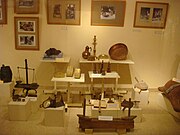
- Egypt
- Cairo — Harat Al-Yahud Al-Qara’In and Harat Al-Yahud
- Morocco
- Tunisia
Asia
- China
- Shanghai — Shanghai ghetto, a temporary Jewish refuge during World War II.
- India
- Kochi – Jew Town, traditional Cochin Jewish district and location of the spice market.
- Lebanon
- Turkey
- Iraq
- Syria
- Damascus – Ḥārat al-Yahūd, a recently restored tourist destination popular among Europeans before the outbreak of the Syrian civil war where vacationers can stay in the neighborhood and beautified former homes of the completely vanished ancient Jewish community.
Americas
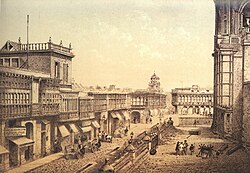
- Argentina
- Brazil
- Venezuela
- Caracas — San Bernardino, Los Chorros, Altamira, Los Caobos and Sebucán
- Mexico
- United States
- Boca Raton, Florida – There are over 175,000 Jewish people in southern Palm Beach County.
- New York City – Williamsburg and Crown Heights in Brooklyn, (historically) the Lower East Side and parts of The Bronx. Northern New Jersey, Long Island, and Rockland County have been home to large Jewish populations since the 1940s and 1950s.
- Pinch District, Memphis, Tennessee — From the 1890s to the 1930s, it was the center of Memphis' Jewish community, with many synagogues and Jewish-owned businesses.
- Pittsburgh – Squirrel Hill, with some spillover into bordering Greenfield, Regent Square, and Shadyside.
- Uruguay
- Canada
- Montréal, Québec – Mile-End/Outremont and Côte-des-Neiges/Hampstead/Snowdon, Côte-Saint-Luc, Saint-Laurent Boulevard
- Toronto – The Ward was the original Jewish district in the 19th century followed by Kensington Market in the early to mid 20th century.
Other regions
In the Americas, Australia, New Zealand and South Africa there are a number of neighborhoods or small towns, generally in large cities or outlying communities of such, which are home to large concentrations of Jewish residents, much in the manner of old-world Jewish quarters or other ethnic enclaves, though without exclusive Jewish population.
References
- Dik Van Arkel (2009). The Drawing of the Mark of Cain: A Socio-historical Analysis of the Growth of Anti-Jewish Stereotypes. Amsterdam University Press. p. 298. ISBN 978-90-8964-041-3.
- "The Virtual Jewish History Tour – Vilnius". Jewishvirtuallibrary.org. Retrieved 10 October 2012.
- Stillman, Norman A. (24 May 2005). "Islam and the Jews". Antisemitism: A Historical Encyclopedia of Prejudice and Persecution [2 volumes]. Bloomsbury Publishing USA. p. 357. ISBN 978-1-85109-444-8. Retrieved 6 October 2024.
- ^ Zafrani, Haïm (1991). Encyclopaedia of Islam, 2nd edition. Leiden: Brill. pp. 292–294. Retrieved 6 October 2024.
- Stillman, Norman A. (1979). The Jews of Arab Lands. Jewish Publication Society. pp. 80–81. ISBN 978-0-8276-1155-9. Retrieved 2 October 2024.
- Stillman, Norman (8 June 2022). Arab Dress, A Short History: From the Dawn of Islam to Modern Times. BRILL. pp. 114–115. ISBN 978-90-04-49162-5. Retrieved 3 October 2024.
- Carole Rawcliffe, Richard George Wilson, Medieval Norwich, Continuum International, 2006, p.18.
- "Enciclopedia del Holocausto". encyclopedia.ushmm.org.
- Barker, Tommy (29 October 2021). "€285k home in Cork's Jewish quarter has chutzpah in spades". Irish Examiner.
- "Jewtown – Simon Lewis".
- "MUHBA El Call". Archived from the original on 10 June 2017. Retrieved 26 March 2015.
- "Iraq's Kurdish Jews Cautiously Return to Homeland". NPR.org.
- "Jewish Quarter of Damascus blooms again". The Jerusalem Post | JPost.com. 5 November 2010.
- Manuel A. Fuentes; Firmin Didot, Brothers, Sons & Co. (1866). Lima or Sketches of the Capital of Peru, Historical, Statistical, Administrative, Commercial and Moral. University of Chicago Library.
{{cite book}}: CS1 maint: location missing publisher (link) CS1 maint: multiple names: authors list (link) - Doris, Tony. "NEW: Demographic study reveals Palm Beach County's Jewish community bucks national trend". The Palm Beach Post. Retrieved 3 June 2021.
- "Rockland County". www.jewishvirtuallibrary.org. Retrieved 3 June 2021.
- "New York State". www.jewishvirtuallibrary.org. Retrieved 3 June 2021.
External links
| Ethnic enclaves | |
|---|---|